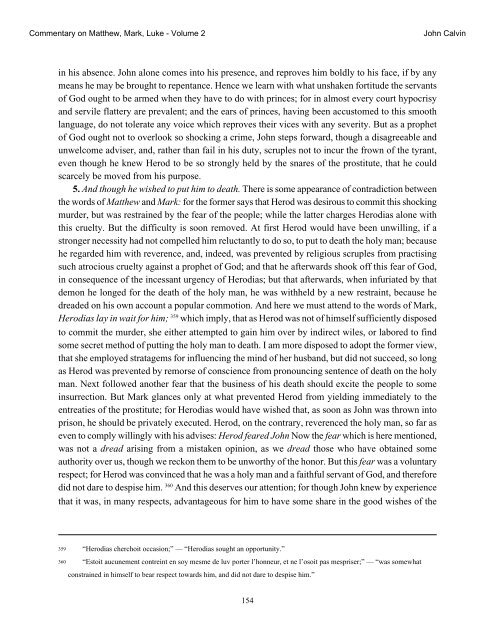Commentary on Matthew, Mark, Luke - Volume 2.pdf
Commentary on Matthew, Mark, Luke - Volume 2.pdf
Commentary on Matthew, Mark, Luke - Volume 2.pdf
You also want an ePaper? Increase the reach of your titles
YUMPU automatically turns print PDFs into web optimized ePapers that Google loves.
<str<strong>on</strong>g>Commentary</str<strong>on</strong>g> <strong>on</strong> <strong>Matthew</strong>, <strong>Mark</strong>, <strong>Luke</strong> - <strong>Volume</strong> 2<br />
in his absence. John al<strong>on</strong>e comes into his presence, and reproves him boldly to his face, if by any<br />
means he may be brought to repentance. Hence we learn with what unshaken fortitude the servants<br />
of God ought to be armed when they have to do with princes; for in almost every court hypocrisy<br />
and servile flattery are prevalent; and the ears of princes, having been accustomed to this smooth<br />
language, do not tolerate any voice which reproves their vices with any severity. But as a prophet<br />
of God ought not to overlook so shocking a crime, John steps forward, though a disagreeable and<br />
unwelcome adviser, and, rather than fail in his duty, scruples not to incur the frown of the tyrant,<br />
even though he knew Herod to be so str<strong>on</strong>gly held by the snares of the prostitute, that he could<br />
scarcely be moved from his purpose.<br />
5. And though he wished to put him to death. There is some appearance of c<strong>on</strong>tradicti<strong>on</strong> between<br />
the words of <strong>Matthew</strong> and <strong>Mark</strong>: for the former says that Herod was desirous to commit this shocking<br />
murder, but was restrained by the fear of the people; while the latter charges Herodias al<strong>on</strong>e with<br />
this cruelty. But the difficulty is so<strong>on</strong> removed. At first Herod would have been unwilling, if a<br />
str<strong>on</strong>ger necessity had not compelled him reluctantly to do so, to put to death the holy man; because<br />
he regarded him with reverence, and, indeed, was prevented by religious scruples from practising<br />
such atrocious cruelty against a prophet of God; and that he afterwards shook off this fear of God,<br />
in c<strong>on</strong>sequence of the incessant urgency of Herodias; but that afterwards, when infuriated by that<br />
dem<strong>on</strong> he l<strong>on</strong>ged for the death of the holy man, he was withheld by a new restraint, because he<br />
dreaded <strong>on</strong> his own account a popular commoti<strong>on</strong>. And here we must attend to the words of <strong>Mark</strong>,<br />
Herodias lay in wait for him; 359 which imply, that as Herod was not of himself sufficiently disposed<br />
to commit the murder, she either attempted to gain him over by indirect wiles, or labored to find<br />
some secret method of putting the holy man to death. I am more disposed to adopt the former view,<br />
that she employed stratagems for influencing the mind of her husband, but did not succeed, so l<strong>on</strong>g<br />
as Herod was prevented by remorse of c<strong>on</strong>science from pr<strong>on</strong>ouncing sentence of death <strong>on</strong> the holy<br />
man. Next followed another fear that the business of his death should excite the people to some<br />
insurrecti<strong>on</strong>. But <strong>Mark</strong> glances <strong>on</strong>ly at what prevented Herod from yielding immediately to the<br />
entreaties of the prostitute; for Herodias would have wished that, as so<strong>on</strong> as John was thrown into<br />
pris<strong>on</strong>, he should be privately executed. Herod, <strong>on</strong> the c<strong>on</strong>trary, reverenced the holy man, so far as<br />
even to comply willingly with his advises: Herod feared John Now the fear which is here menti<strong>on</strong>ed,<br />
was not a dread arising from a mistaken opini<strong>on</strong>, as we dread those who have obtained some<br />
authority over us, though we reck<strong>on</strong> them to be unworthy of the h<strong>on</strong>or. But this fear was a voluntary<br />
respect; for Herod was c<strong>on</strong>vinced that he was a holy man and a faithful servant of God, and therefore<br />
did not dare to despise him. 360 And this deserves our attenti<strong>on</strong>; for though John knew by experience<br />
that it was, in many respects, advantageous for him to have some share in the good wishes of the<br />
359 “Herodias cherchoit occasi<strong>on</strong>;” — “Herodias sought an opportunity.”<br />
360 “Estoit aucunement c<strong>on</strong>treint en soy mesme de luv porter l’h<strong>on</strong>neur, et ne l’osoit pas mespriser;” — “was somewhat<br />
c<strong>on</strong>strained in himself to bear respect towards him, and did not dare to despise him.”<br />
154<br />
John Calvin

















